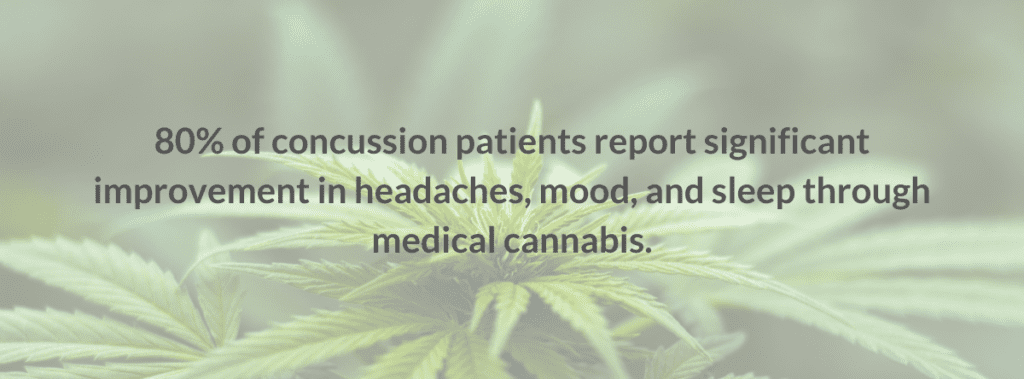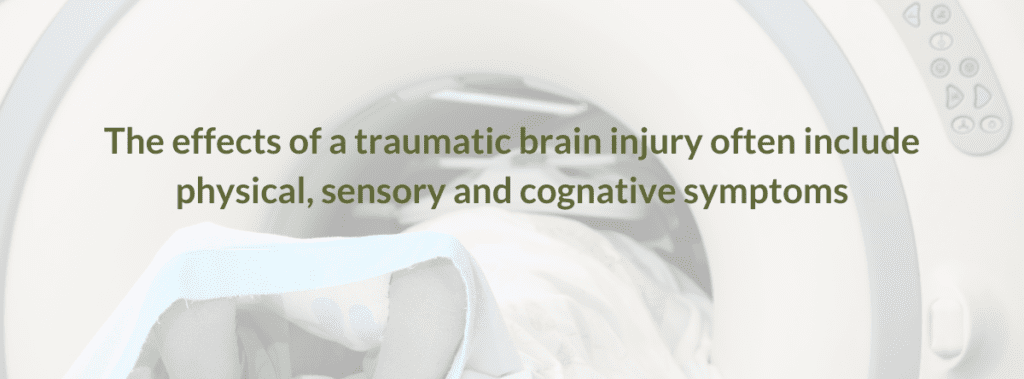Cannabis and Traumatic Brain Injury (TBI): What the Research is Revealing
It is estimated that one million people in America seek medical treatment for a traumatic brain injury (TBI) every year, with around 5.3 million people living with a brain injury-related disability.
According to the CDC, traumatic brain injury is usually caused by a blow or other traumatic injury to the head or body, including if an object pierces the skull and brain tissue. Traumatic brain injuries can be caused by falls, vehicle-related collisions, violence, sports injuries, or being in the vicinity of explosive blasts.
Brain injuries manifest in different ways for different people. Some TBI results in an altered state of consciousness characterized by changes in responsiveness or awareness. Some experience physical troubles like headaches/migraines, vertigo, or even seizures. Other TBI sufferers report cognitive problems, difficulty with executive function, behavioral changes, emotional problems, or sensory issues.
Treatment for TBI varies by type of injury. Some people may recover through significant rest, while others may need medications, rehabilitation, or even surgery to relieve the symptoms of a traumatic brain injury. As of now, no pharmaceutical medication entirely alleviates symptoms of TBI.
More Americans with Traumatic Brain Injury are turning to medical cannabis to mitigate troubling mental and physical symptoms. While the research in this area may still be building, what research is available reveals that cannabis may provide significant relief to those living with TBI.
The Endocannabinoid System and Traumatic Brain Injury (TBI)
The most available research on cannabis hinges on an understanding of the endocannabinoid system (ECS). The endocannabinoid system has been described by prominent cannabis researcher Dr. Ethan Russo as “a key mediator of physiological homeostasis, thus ensuring that various bodily systems function within tight parameters with neither a deficiency nor excess of activity.” The ECS regulates all bodily systems, essentially ensuring they work together to bring the body into balance or homeostasis.
Central to the endocannabinoid system is the body’s ability to produce endocannabinoids. It was discovered in the early-1990s that our body produces endocannabinoids that react with the cannabinoid receptors found all around the body. Anandamide (also known as the “bliss molecule”) was the first endocannabinoid to be discovered and is believed to be responsible for regulating sleep, mood, memory, appetite, reproduction, and how the body experiences pain.
Cannabis also produces cannabinoids, known as phytocannabinoids. When undergoing cannabis therapy, the body receives more of what it already makes to regulate the body through the plant. This is the secret to all cannabis medicine.
When a traumatic brain injury occurs, it is believed that the brain releases endocannabinoids to damaged tissue to produce a neuroprotective response. One study said of the ECS and brain injury: “There is a large body of evidence showing that eCB (endocannabinoids) are markedly increased in response to pathogenic events. This fact, as well as numerous studies on experimental models of brain toxicity, neuroinflammation, and trauma, supports the notion that the ECB is part of the brain’s compensatory or repair mechanisms.”
Cannabis for TBI-Related Headaches & Pain
Headaches and migraines are common symptoms of TBI. In Buffalo, NY, there is an “ongoing retrospective analysis” where patients who have suffered concussions are being evaluated as they use medical cannabis to alleviate headache, mood, attention, sleep, and dizziness symptoms.
The ongoing study reveals that up to 80% of concussion patients report significant improvement in headaches, mood, and sleep through medical cannabis. In addition, the results of this ongoing study suggest that tinctures with a 1:1 ratio of THC:CBD are particularly helpful to manage long-term symptoms. At the same time, cannabis vaporized in high levels of THC brought on relief for headaches associated with brain injury.
Cannabis to Protect and Restore the Brain
Cannabis has long been regarded as a neuroprotectant, helping to reduce trauma on the brain during a head injury or a degenerative disease such as Alzheimer’s Disease or Parkinson’s Disease.
In the context of Alzheimer’s Disease, cannabinoids are showing promise in modulating pathological processes, including neuroinflammation (inflammation around the brain), excitotoxicity (damage or death to neurotransmitters or signals from the brain), and oxidative stress (an imbalance between antioxidants and free radicals in the body).
The neuroprotective antioxidant effects of cannabinoids have been shown to have an ability to counteract excitotoxicity to prevent the demise of neurons after a traumatic brain injury. In addition, it has been observed and recorded that both THC and CBD are helpful in the treatment of chronic traumatic encephalopathy (CTE) symptoms which include headache, nausea, insomnia, dizziness, agitation, substance abuse, and psychotic symptoms. CTE was formerly known as being “punch drunk” after a blow to the head, commonly associated with professional sports fighters.
Cannabis for Other TBI Symptoms Management
The range of symptoms one experiences after a TBI varies, but one thing that is common is that people with TBI experience increased anxiety. Reviews of research on cannabis and anxiety point to the endocannabinoid system as crucial in regulating anxiety and fear-based behaviors. CBD is primarily regarded as a potent regulator of serotonin in the brain.
Sleep is also a common pain point for people living with TBI, and initial studies show that the endocannabinoid system helps regulate the sleep-wake cycle and bring about sleep homeostasis, which is the body’s way of signaling whether it has had enough sleep.
Current Ongoing Clinical Trials
While specific research on TBI and cannabis has been somewhat limited to this point, there are currently several ongoing global clinical trials that are looking at how cannabis can alleviate symptoms of TBI.
The University of Miami is undergoing a 5-year study to assess the effectiveness of a cannabinoid-based pill on concussions, with the hypothesis that cannabinoids will reduce brain inflammation and the immune response. The National Hockey League (NHL) is currently partnering with Canopy Growth in Canada to research how cannabinoids may treat post-concussion neurological diseases in former NHL hockey players. In Australia, a new cannabinoid formula is being tested amongst Mixed Martial Arts (MMA) fighters to assess how cannabinoids can mitigate cell death following head trauma.
The swell of studies looking at cannabis and traumatic brain injury is promising. It indicates that scientists have noted how cannabis is helping people with TBI and are interested in drilling down exactly how through clinical research. We can only expect more research on cannabis and TBI to emerge within the next several years.
Explore Cannabis for TBI with Compassionate Clinics of America
Compassionate Clinics of America invites those with TBI or their caregivers to consider cannabis as a mechanism to mitigate the often-troubling symptoms of TBI.
Our dedicated and knowledgeable prescribing physicians and Nurse Practitioners will take the time to listen to concerns around symptoms of TBI and work with patients to start their journey with medical cannabis. At Compassionate Clinics of America, we believe that everyone is entitled to explore various forms of medicine to find the relief they need and deserve. Connect with us today to discuss medical cannabis for traumatic brain injur

























